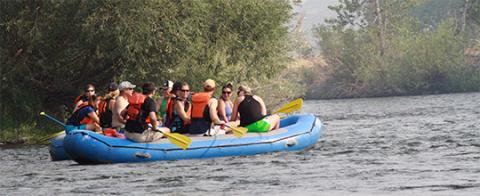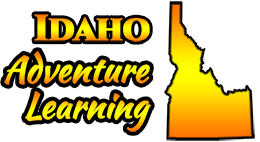Teachers work with Boise State University researchers and other experts to study the implications of climate change and urban/rural development on water quantity in the Treasure Valley. Through field trips and presentations, participants learn about the importance of water and value of ecosystem services from the viewpoints of a variety of stakeholders.
Boise - Treasure Valley

Blog Posts
Integration
Ashlee Kolar • Jul 15, 2017
I knew when I joined this year that the idea of integrating this into my job would be a bit different and probably difficult due to the fact that I no longer teach in a classroom. I feel the benefit for me is to add these resources into our Content Development Team Resources so that when we have... more
Integration
Luke Kolar • Jul 15, 2017
When reflecting on how to apply everything I've read and learned this week my mind goes to chemistry and energy. Both are units i teach in physical science and it seems that the content covered this meek naturally fits in these realms.
For energy my initial plan is to... more
Integrating into the classroom
Kristine Kempthorne • Jul 14, 2017
This has been an eye opening experience. There are so many things that I have learned and/or didnt really consider before, such as the watershed and the ecosystem. I can not wait to incorporate all that I have learned into the classroom. My students will love it and they will be surprised at all... more
Great example of Ecosystem Services in the News
Angela Becker • Jul 14, 2017
Wanted to share in case you missed it!
Add Some Adventure
Brian Zuber • Jul 14, 2017
Both last year and this year, there are tons of takeaways and good ideas to bring to our classrooms through the MILES Adventure workshops, I'm so glad for this program! For me, there are two major takeaways, the first is to add a little adventure into the classroom! Take the kids outside when... more
Resources
The Story of Drinking Water
 CDC Drinking Water Resources
CDC Drinking Water Resources Idaho DEQ drinking water FAQ's
Idaho DEQ drinking water FAQ's
![]() TheStoryOfDrinkingWater.pdf
TheStoryOfDrinkingWater.pdf
Added by: Cindy Busche
The Story of Drinking Water treatment process hand-out by AWWA scanned from a booklet. Original PDF can be found by google searching the document title.
Resource type: Fact Sheets / Handouts
Grants for Teachers for field trips and resources
Added by: Cindy Busche
A short list of grant opportunities for field trips and classroom resources
Resource type: Opportunities
Web Resources and Apps
Added by: Cindy Busche
Web Resources and Apps related to the Adventure Learning topics.
Resource type: Other
Socio-ecological mind map examples
![]() socio-ecological mind map middle school (2).pdf
socio-ecological mind map middle school (2).pdf
Added by: Cindy Busche
Here are examples that Mary Lugg presented of socio-ecological mind maps that could be created by students.
Resource type: Notes
Pollinator resources
![]() Pollinator identification chart.pdf
Pollinator identification chart.pdf
Added by: Cindy Busche
Pollinator resources: identification chart and Pollinator syndromes provided by BLM Botanist Holly Hovis
Resource type: Fact Sheets / Handouts
Lesson Plans
We're All In This Together - Intro to Human-Environment Systems Lesson Plan by Chelsea Merriman
![]() We're All In This Together HES lesson plan.docx
We're All In This Together HES lesson plan.docx
Added by: Cindy Busche
Lesson presented by BSU student Chelsea Merriman during the Adventure Learning course at Eagle Island State Park.
Topic: Ecosystem Services
Ecosystem, what is it?
Added by: Todd Thompson
This lesson plan is meant to introduce drama students to ecosystem services using the tools of monolgue and/or dialogue.
Topic: Ecosystem Services
pH levels in water
![]() Idaho Adventure Learning - pH.doc
Idaho Adventure Learning - pH.doc
Added by: Shannon Erickson
Students will test the pH level of water around the school and create a data display for the class's data.
Topic: Mathematics/Engineering, Water Quality
Types of Ecosystem Services
Added by: Dani Wilson
Introductory activtiy into the types of ecosystem services.
Topic: Ecosystem Services
Nature Haiku
Added by: Tucker Williams
Essential Question: How can nature inspire my writing?
Overview: Students will connect with nature by taking photos of nature and writing a response to the photos. Lesson will end with two outstanding haiku.
Keywords: haiku, Japan, nature, movement, syllable, poetic device (simile).
Subject: ELA - English Language Arts
Age: 6th grade
Goals: 1) Students connect with nature. Students observe nature, then write about nature. 2) Students notice finer details about nature. 3) Students use observation details to create short poem.
Objectives: Students apprecite nature by studying and writing about it.
Materials: note taking paper, camera (phone) or drwaing pad, Haiku definitions/rules.
Set up: This activity will come after a Haiku unit. Students will already understand the rules and methods of Haiku.
Class examples:
1) Show students nature pictures. Ask them to study picture and write five details.
2) Ask students to write a simile describing the picture.
3) Ask students to write the main points for possible Haiku: subject, season, movement.
4) Write a class Haiku for picture.
5) Hand each student a picture of nature. Have each student go through the Haiku process.
6) Use class camera or phone to take a new picture of nature. Repeat steps 1-4 as a class or with partners.
Student Assignment: Ask students to use a camera or phone when they go home. Go through the process of taking picture and writing poem twice on your own. Possibly try to relate photos to what students are doing in science class.
At the end of poetry unit, students create a nature, poem book. They can print or draw the nature pictures that they took. Students can also just draw a picture of nature and not use an electronic device.
Assess: Poetry book (final project), single poems along the way. Possible student presentations.
Hopefully by the end, students will appreciate the smaller details of nature. This unit will lead into a study of eco-sytems and how humans affect nature. What this lesson lacks is the importance of nature and how people affect nature. Hopefully, first, students can try to appreciate the beauty of nature, and then that will lead to the importance of nature.
Topic: Other
